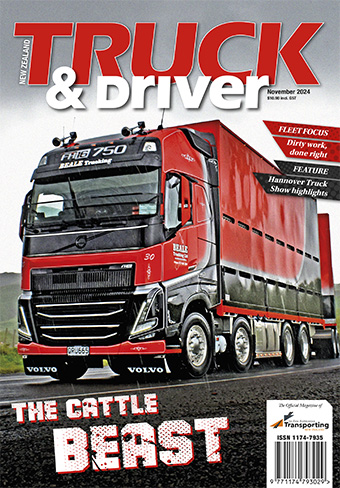Aeolus Truck & Driver News


More co-funded EV projects
Aeolus Truck & Driver News
The third round of Low Emission Transport Fund allocations will provide $2.14 million in co-funding and includes several road transport projects.
Among 11 new projects are clever solutions for electric vehicle charging, ways to cut fuel costs in heavy freight, and the first marine project will get co-funding for a trial of small electric outboard motors.
“In total, the projects will receive $2.14 million from the Government’s third round of The Low Emission Transport Fund so they can trial new ways of slashing emissions in the transport sector, in areas that were previously seen as hard to decarbonise,” says Energy and Resources Minister Dr Megan Woods.
“It’s also great to see projects looking at saving money and waste at the same time by targeting inefficiencies in freight.
“Freight and transport management companies Findatruckload and iCOS LIVE, will partner to identify `empty legs’ - when trucks return empty,” says Dr Woods.
...The third round of Low Emission Transport Fund allocations will provide $2.14 million in co-funding and includes several road transport projects.
Among 11 new projects are clever solutions for electric vehicle charging, ways to cut fuel costs in heavy freight, and the first marine project will get co-funding for a trial of small electric outboard motors.
“In total, the projects will receive $2.14 million from the Government’s third round of The Low Emission Transport Fund so they can trial new ways of slashing emissions in the transport sector, in areas that were previously seen as hard to decarbonise,” says Energy and Resources Minister Dr Megan Woods.
“It’s also great to see projects looking at saving money and waste at the same time by targeting inefficiencies in freight.
“Freight and transport management companies Findatruckload and iCOS LIVE, will partner to identify `empty legs’ - when trucks return empty,” says Dr Woods.
The service will automate freight alerts to trucks about to run empty to allow them to fill their empty leg, generate more revenue, eliminate the need to put another truck on the road to move the same freight, and thereby save emissions. The project has received $91,000 in funding.
“We are also happy to support work on one of the big reasons that stop prospective buyers from purchasing EVs - slow charging.”
A $397,000 grant will see Red Phase Technologies working with Z Energy and Powerco to integrate a super high-speed charger at a Waiouru site, using technology that will reduce the impact on the grid. The system delivers four chargers providing over 180kW each.
Jump Charging is the recipient of $101,094 to build a portable skid-mounted 75kW DC rapid charging station that can be installed in locations that require temporary increases in EV charging demand such as special events or emergency situations.
Other grants include $252,000 for Swire Shipping’s coastal shipping company, Pacifica Shipping to deploy two XCMG E700 electric trucks to move full containers for the first and last mile at the ports of Auckland and Christchurch, connecting with Pacifica Shipping’s coastal services operating between Auckland and Lyttleton.
The trucks can handle around six containers each daily, at both Auckland and Christchurch between warehouse and port. Swire estimates that this system will decarbonise 3,000 truck movements in the first year alone building to over 9,000 decarbonised journeys by the third year of operation.
The combined use of zero emission first and last mile transport, connected to coastal shipping, will offer shippers the lowest emission supply chain for inter-island containerised cargoes in New Zealand. One of the trucks will be at Swire’s own cost.
A grant of $343,398 will allow National Steel to purchase a 28-tonne electric truck fitted with a fully electric hydraulic arm and hook, to operate at its metal shredding and recovery facility in Wiri, Auckland. The truck will replace a 5-year-old diesel truck, and a lengthened chassis will enable the truck to carry standard skips.
The Low Emission Transport Fund, administered by EECA (Energy Efficiency and Conservation Authority), supports the demonstration and adoption of low emission transport technology, innovation and infrastructure to accelerate the decarbonisation of the New Zealand transport sector. Learnings from LETF projects will lead efforts reduce transport emissions by 41% by 2035.
Organisations were able to apply for up to 50% of the cost of projects that met specific objectives. Recipients of round four and round five funding for projects that support the adoption of public charging infrastructure will be announced in the near future.




 + EQUIPMENT GUIDE - FREE
+ EQUIPMENT GUIDE - FREE
